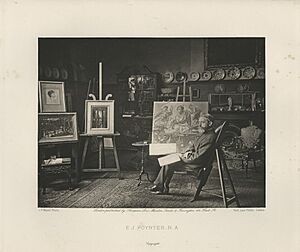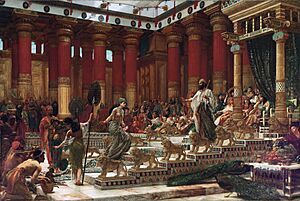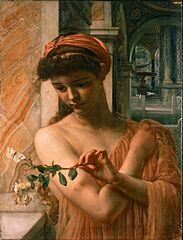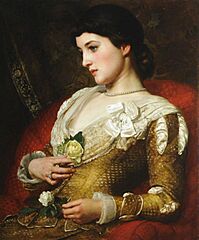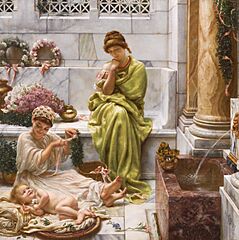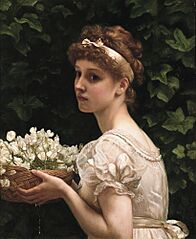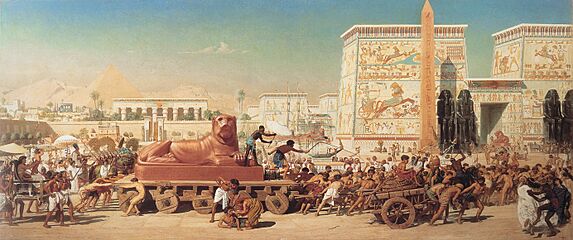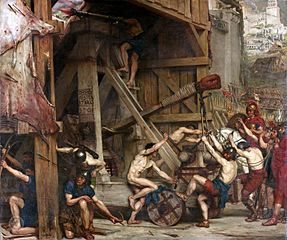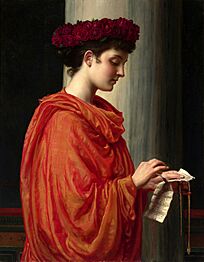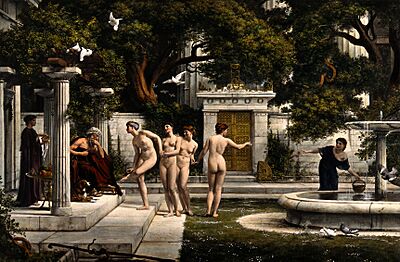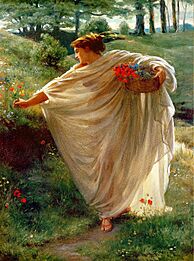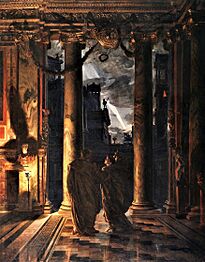Edward Poynter facts for kids
Quick facts for kids
Edward Poynter
|
|
|---|---|
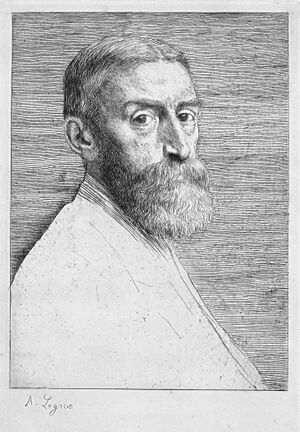
Edward Poynter, 1877 (Alphonse Legros)
|
|
| Born |
Edward John Poynter
20 March 1836 Paris, France
|
| Died | 26 July 1919 (aged 83) London, England
|
| Nationality | British |
| Education | Brighton College Ipswich School |
| Occupation | Painter, designer, and draughtsman |
| Spouse(s) | Agnes MacDonald |
| Children | 3 |
Sir Edward John Poynter (born March 20, 1836 – died July 26, 1919) was a famous English artist. He was a painter, designer, and draughtsman (someone who draws detailed plans). He even became the President of the Royal Academy, which is a very important art institution in England.
His Life Story
Edward Poynter was born in Paris, France. His father, Ambrose Poynter, was an architect. Soon after Edward was born, his family moved back to Britain.
Edward went to school at Brighton College and Ipswich School. However, he had to leave school early because he wasn't well. He spent winters in warmer places like Madeira and Rome to feel better.
In 1853, when he was 17, Edward met another famous artist, Frederick Leighton, in Rome. This meeting really inspired young Edward. When he returned to London, he studied art at Leigh's Academy and the Royal Academy Schools. Later, he went to Paris to study with the classicist painter Charles Gleyre. Other well-known artists like James McNeill Whistler and George du Maurier were also studying there.
In 1866, Edward Poynter married Agnes MacDonald. She was known for her beauty. They had three children together. Agnes came from a very interesting family! Her sister Georgiana married the artist Edward Burne-Jones. Another sister, Alice, was the mother of the famous writer Rudyard Kipling. And her sister Louisa was the mother of Stanley Baldwin, who became the Prime Minister of the United Kingdom three times.
Edward's own sister, Clara Bell, became a well-known translator of books and scientific papers.
His Art Career
Edward Poynter became famous for his large historical paintings. One of his most well-known works is Israel in Egypt (painted in 1867), which you can see at the Guildhall Art Gallery in London. He also created St George for England (1869), which was a mosaic for the Palace of Westminster. This mosaic shows St George and the Dragon.
One of his biggest and most famous paintings is The visit of the Queen of Sheba to King Solomon (painted between 1884 and 1890). This impressive artwork is now in the Art Gallery of New South Wales, Sydney.
Poynter held many important positions in the art world. He was the first Slade Professor at University College London from 1871 to 1875. He also served as the head of the National Art Training School from 1875 to 1881. From 1894 to 1904, he was the director of the National Gallery. During his time there, the Tate Gallery (another famous art museum) was opened.
In 1876, he became a full member of the Royal Academy. Then, in 1896, after the death of Sir John Millais, Poynter was chosen to be the President of the Academy. In the same year, he received a knighthood, which meant he could be called "Sir Edward." He also received an honorary degree from Cambridge University in 1898.
In 1902, he was given a special title called a baronetcy. This meant he became "Sir Edward John Poynter, 1st Baronet."
His old school, Brighton College, held a special exhibition of his paintings and drawings in 1995. It was called Life at Arms Length.
His Artworks
Paintings
-
Sir Edward John Poynter — Cave of the Storm Nymphs.jpg
The Cave of the Storm Nymphs (1903)
-
Portrait of Lillie Langtry, 1878
Stained Glass
Early in his career, Edward Poynter also designed beautiful stained-glass windows. Sometimes, parts of his first designs were used again in later windows.
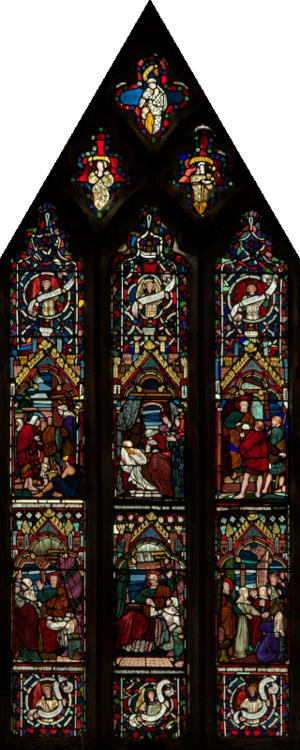
Written Works
Edward Poynter also wrote some books, often working with other authors like H. J. Wilmot Buxton and Percy Head.
 | Isaac Myers |
 | D. Hamilton Jackson |
 | A. Philip Randolph |


